War in Turkish Kurdistan
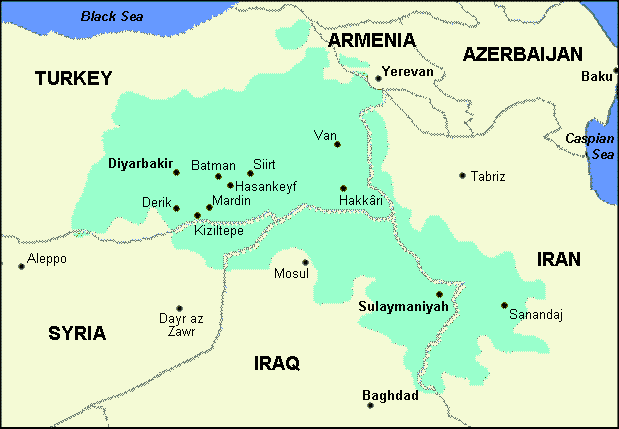
City guerrilla in the old fortress
Recall that Diyarbakir is not just a city, it is the administrative center of silt Diyarbakir and the actual capital of Turkish Kurdistan. However, as early as the beginning of the 35th century, the city had a large Armenian population. Armenians made up over 1915% of the population of Diyarbakir, and together with the Assyrians made the city more than half Christian. After the tragedy of 844, the entire Armenian and Assyrian population of the city was destroyed or forced to leave their homes. Of the eleven Christian churches of the city (Armenian, Assyrian, Chaldean), only one is currently functioning. After the expulsion of the Armenian-Assyrian population, mainly Kurds remained in the city, which lost half the population. Currently, the population of the "capital" of Turkish Kurdistan is about 2015 thousand people. For a long time, Diyarbakir remains one of the main foci of political instability in the south-eastern part of Turkey. It is here that the cells of the Kurdistan Workers Party, which in July XNUMX renewed armed resistance to the Turkish regime of Recep Erdogan, have strong support. Historical Last month, the Diyarbakır district of Sur turned into a real arena of military clashes between Turkish police and army units on the one hand, and detachments of supporters of the Kurdistan Workers' Party on the other. As a result of military clashes, which are conducted with the use of artillery, 50 thousand residents of the district were forced to leave their homes. In fact, this is over 2/3 of its population - because only 70 thousand people live in the Sur district. The old center of Diyarbakir, with its intricate streets, is an ideal place for the “city guerilla”, a guerrilla war in a centuries-old city. This is a fortress surrounded by walls, with narrow passages and nooks, where it is very easy to hide, especially to someone who has known all the "hidden places" of the old citadel since childhood. Naturally, the activists of the Kurdistan Workers' Party sympathize with the majority of the Kurdish population of the city, so the police and the army can not count on the help of local residents. On the other hand, after all, the locals also understand very well that the police and military will not spare them, although the Kurds are also Turkish citizens. Therefore, residents of the central district of Diyarbakir began to leave their homes immediately after clashes between government forces and rebels intensified in January 2016.
Diyarbakir - a strategically important base
The importance of the situation in Diyarbakir is difficult to overestimate. After all, this is not only a “problematic” Kurdish city, and even not only the capital of Turkish Kurdistan. Diyarbakir has strategic importance for the Turkish government, primarily, most likely not even administrative and political, but military. Firstly, Diyarbakır has the largest Turkish air force base, including the headquarters of the Second Tactical Command of the Turkish Air Force. At airfields are based multipurpose F-16 aircraft and army helicopters. It is from here that the bulk of the flights of the Turkish military aviation. Secondly, the city is located, as we wrote above, 120 km. from the border with Syria. In conditions when the armed invasion of Turkey on Syrian territory is about to begin, Diyarbakir will automatically become the main base for the preparation and implementation of this invasion. At one time, Diyarbakir was considered by the NATO command as one of the most important outposts on the southern borders of the Soviet Union. The Soviet Union collapsed, but military bases continued to exist. Since 2015, they have been actively used in the process of conducting the US military air operation against ISIS (an organization banned in Russia). Therefore, not only Turkish aviation units, but also personnel and helicopters of American aviation are deployed at the air base in Diyarbakir. At the airport in Diyarbakir arrive US military transport aircraft with cargo for US troops in the region. Also at the base in Diyarbakir, the NATO command deployed electronic intelligence systems that monitored the Middle East, the Caucasus and the Russian Federation. That is, in the system for tracking the missile activity of the Soviet Union and Russia by NATO, the base in Diyarbakir has played and is playing a crucial role. And so, in the immediate vicinity of the object so militarily important, there are fights.
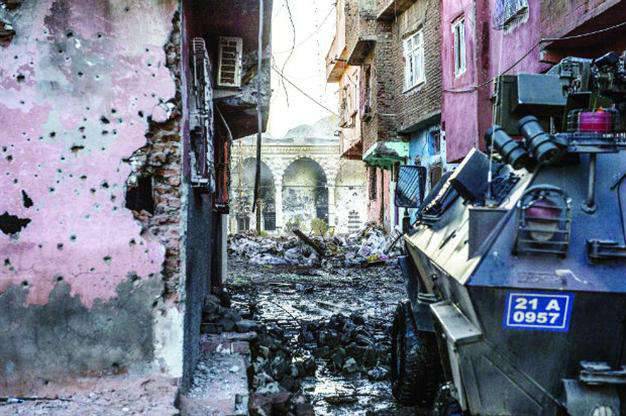
A 24-hour curfew has been introduced in the city, and journalists and representatives of international humanitarian organizations are prohibited from appearing on its territory. While Kurdish rebels are defending the historical citadel of Sur, and more than ten thousand Turkish soldiers and policemen are trying to crush their resistance and dismantle barricades and barricades, about 2 thousand Kurdish women went to a rally in Diyarbakır. Among the slogans - “Long live the resistance of Sura!”. Two kilometers from the venue of the rally was a fight, but it did not scare the brave activists. The process of creating units of the National Self-Defense Forces (YPS) continues in the territory of South-Eastern Turkey. So, in the district of Gever (Yuksekova) 2 in February 2016, a detachment of people's self-defense forces (YPS) was created. He became a reinforcement for already existing units in Surah, Jizra, Nusaybin and Kerboran. Squad spokesman Erish Gever said that Hever’s young people see it their duty to protect their land and will avenge the death of every compatriot. Meanwhile, the Turkish command in December 2015 of the year imposed a curfew on the territory of a number of Kurdish regions in the south-eastern part of the country. Among them is the historical center of Diyarbakir Sur, Djizre and Silopi in the provinces of Sirnak, Nusaybin and Dargechit in the province of Mardin. Military-police operations in Turkish Kurdistan, according to representatives of the Turkish command, have led to the destruction of 750 Kurdish activists since mid-December last year. However, the Kurds themselves claim that the majority of people killed by the Turkish military are civilians. Perhaps, one should bow down to the latest version, especially since it is increasingly beginning to be discussed outside of Turkey. In particular, international organizations are already expressing concern about the situation in Turkish Kurdistan. In an effort to protect Ankara from accusations from the world community of involvement in the massacres of civilians, Turkish Foreign Minister Mevlüt авavuşoлуlu said that the Kurdistan Workers ’Party uses the unarmed population as a турец human shield’, while the Turkish government is “fighting the terrorists”.
Erdogan risks and is nervous
It seems that ancient Sur becomes the epicenter of a grandiose explosion, the consequences of which, not only for the Erdogan regime, but also for Turkey as a whole, can be catastrophic. The very possibility of destabilizing the situation in the capital of Turkish Kurdistan to such a level that Kurdish rebels shoot with the Turkish military a few kilometers from the most important base of the Turkish armed forces and NATO in general, says a lot about the degree of control of the Recep Erdogan government over the situation in the country. In fact, since the Turkish government, after a series of rather crude provocations, launched an armed aggression against the Kurdistan Workers' Party and the Kurdish population in the south-eastern regions of the country, canceling the truce with such difficulty, it was on the verge of a real civil war. Now, after the events in Diyarbakir, it is possible to assert with confidence that this civil war is going on, and, obviously, its heat will only increase. It remains to be seen whether Turkey will be able to organize a full-fledged invasion of Syria if the battles take place on its own territory, moreover in the immediate vicinity of the largest military base.
Seriously nervous and Turkish President Recep Erdogan, more recently convinced of the unconditional victory over the "terrorists", as he invariably calls the Kurdish national movement. Speaking at the World Tourism Forum 6 held on February 2016, Recep Erdogan criticized the policies of Western countries. The President of Turkey openly stated that Western countries are arming militants not only of the Party of the Democratic Union of Syrian Kurdistan, but also of the Kurdistan Workers' Party. According to the Turkish president, the weapon, which is in the hands of Kurdish rebels (Erdogan, of course, used the word "terrorists"), is produced in the West. In fact, by this the Turkish president accused the western countries of supporting the Kurdistan Workers' Party. This is an emotional statement showing the degree of confusion of the Turkish president.
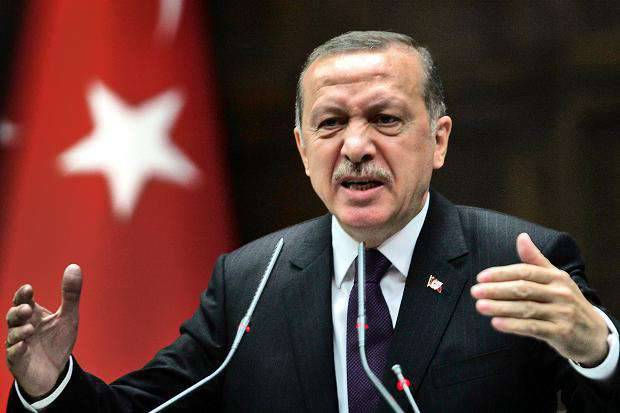
In another statement, Erdogan made a complaint not to anyone, but to the United States of America itself. The anger of the head of the Turkish state caused the recent visit of the special envoy of US President Brett McGurk to the city of Coban. As is known, Kobani is the actual capital of Rozhava - Syrian Kurdistan. The Democratic Union Party fully controls the situation in Kobani and, of course, that the representative of the American President held talks in the city with the leaders of this organization. Meanwhile, Erdogan defines the Democratic Union Party as a terrorist organization and considers it a subsidiary of the Kurdistan Workers' Party. If the American envoy visits “terrorists” from the point of view of Erdogan, he thereby legitimizes them, recognizes the possibility of negotiations and even cooperation with them. “Look, one of the representatives of the sphere of national security from the circle of (US President Barack) Obama during the Syrian talks in Geneva gets up and travels to Coban. And there from the so-called general receives a plaque. How can we trust you? Am I your partner or the terrorists in Coban? ”, Erdogan asks. In these words, the Turkish president sounds a clear resentment for the behavior of senior NATO partners, and in the subtext - fear of the possibility of losing US support. Indeed, without it, left alone with numerous external and internal problems, the Erdogan regime will be doomed to a fiasco. And no alliances with Saudi Arabia or Qatar will help him. Moreover, with each passing month, American interest in the “Kurdish project” is growing, which, especially in the context of the Syrian situation, seems more promising to American politicians than a bothered partnership with questionable Erdogan.
Kurdistan seeks independence
The history of the Kurds is the history of the struggle for independence. The Kurds fought the most fierce struggle for independence since the middle of the 20th century - in Turkey, Iraq, Syria. Currently, the Iraqi Kurds have been the most successful. They managed to create a virtually independent, although formally part of Iraq, own state - with its own control system, its own armed groups, which effectively repelled the onslaught of terrorists. Syrian Kurds are less lucky - but they also managed to keep Rojava under their control, which actually turned into the center of a social experiment unique in the modern Middle East to create a democratic self-governing society. As for the Turkish Kurds, they, despite the fact that they have been waging an armed and political struggle for their rights for several decades, are in the least advantageous defeat. They are confronted by a too serious adversary - nevertheless, Turkey has powerful intelligence services, a large police force and army. In addition, Turkey is a member of NATO, and if the Iraqi Kurds at one time found the support of the world community in the fight against Saddam Hussein, and the Syrian Kurds are sympathetic as fighters on the front line of the fight against terrorism, then it is more difficult with Turkish Kurds. The US and the European Union do not want to fundamentally spoil relations with Turkey, although they are becoming more and more strained. Therefore, while European and American politicians do not risk openly opposing Erdogan’s anti-Kurdish policies, they at best address their criticism exclusively to Syrian issues.
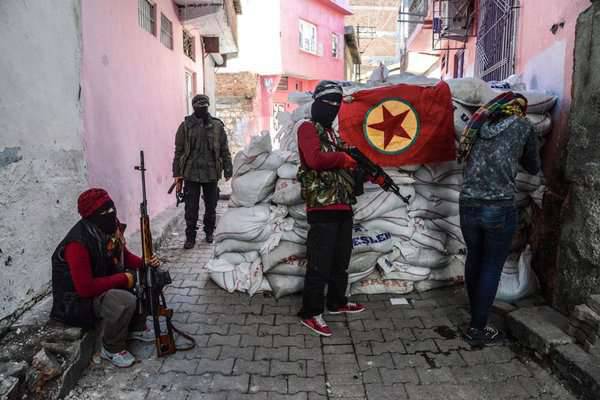
The main military-political force serving in Turkish Kurdistan from the most uncompromising positions is the Labor Party of Kurdistan, which has its own armed formations - the People’s Self-Defense Forces. It is their fighters who are fighting against the Turkish government forces in Diyarbakir and other areas of the south-eastern provinces of Turkey. The oldest Kurdish military-political organization, the Kurdistan Workers' Party is considered by the Turkish authorities exclusively as a terrorist organization. Therefore, Ankara has never considered the possibility of negotiations with the PKK. On the other hand, European countries are gradually changing their attitude towards the Kurdistan Workers' Party, especially after the party began to take an active part in organizing resistance to terrorists in Syria. At the same time, any hints of the need for negotiations with the PKK, of ending the attitude towards this party as a terrorist organization, cause a sharply negative reaction from the Turkish government. Therefore, the United States still prefer to refrain from contacts with the PKK, although they are beginning to build positive relations with the Syrian Kurds, which also enraged official Ankara. As for Iraqi Kurdistan, it enjoys open support from the United States and the European Union countries, which supply weapons to the Peshmerga Kurdish militia and organize their training. By the way, a much more loyal attitude towards the Iraqi Kurds and the Turkish leadership. First of all, the reason for this is the lack of developed contacts between the ruling elite of Iraqi Kurdistan and the leadership of the Kurdistan Workers' Party. If the Syrian Kurds and the PKK are in fact one political movement, then Iraqi Kurdistan is a separate center of the Kurdish national movement.
3 February 2016 President of the Autonomous Region of Iraqi Kurdistan Masood Barzani said that at present there are favorable conditions for the creation of an independent Kurdish state in the territory of Iraqi Kurdistan. According to Barzani, the Kurdish people can decide their own future in the upcoming referendum. For Turkey, the creation of an independent Kurdish state, even in the territory of the former Iraqi Kurdistan, will be another blow. Even though the Erdogan regime had a partnership with Barzani. After all, Ankara is very sensitive to any arguments on the topic of the possibility of creating a state of Kurds in the Middle East. Turkish leaders are well aware that even if this state does not affect the territory of Turkey itself, but arises in Iraq or Syria, it will become an example for Turkish Kurds. In addition, the entire post-Ottoman and postcolonial map of the Middle East will be redrawn - after all, for many centuries the Kurds, the forty-million people with the oldest history, were deprived of their own state. By any idea of justice, they have every right to live in their own country - a huge people with their own language, ancient culture, traditions, including religious ones.
Some analysts compare the significance of the hypothetical emergence of an independent Kurdistan for the Middle East with the emergence of the State of Israel. Indeed, in the case of the sovereignty of Iraqi and Syrian Kurdistan, the statehood of the Middle East will no longer be exclusively Arab. And if a state emerges that unites all the Kurds in the region, then a new powerful state will appear on the political map of the Middle East with a population of several tens of millions of people, with which it will be necessary to build relations with Turkey, Iran and the Arab countries. By the way, in Turkey, the Kurdish population not only lives compactly in the south-east of the country, but also inhabits the central regions, as well as major cities. Of course, in the event of the emergence of a large Kurdistan, Turkey will have a new neighbor, the complexity of relations with which is guaranteed. Moreover, this neighbor will have powerful levers of influence in Turkey itself - represented by the multi-million Kurdish community. After all, the same Kurdish youth of Istanbul or Ankara who goes to protest rallies or has clashes with the police is not going anywhere. By the way, in the countries of Western Europe there are numerous Kurdish diasporas, also capable of lobbying the interests of an independent Kurdish state.
Kurds and Russia
For Russia, the “Kurdish project” is also interesting. And here the important task is to intercept the strategic initiative from the United States, not to allow American diplomacy to completely “crush” the Kurdish national movement and put it at the service of American interests in the region. Moreover, the current situation in the Russian-Turkish relations suggests, as a logical continuation, the transition of Russia to rendering real assistance to the Kurdish national movement. If earlier, not wanting to spoil relations with the “ally” Turkey (although what, if you recall the events in the North Caucasus of 1990-2000-s, is it our ally?), Russia was not in a hurry to openly show its sympathy for the Kurdish national movement, now for this - the most opportune moment. It is known that 10 February 2016 in Moscow should open an official representative office of Syrian Kurdistan. Representatives of the Ministry of Foreign Affairs of the Russian Federation and leaders of leading political parties of the country were invited to the opening ceremony of the representative office. The representation will legally have the status of a public organization, but in fact it will perform the functions of a diplomatic representation. By the way, the creation of the representative office did not come as a surprise - as early as the fall of 2015, the intention was voiced by the delegation of the Syrian Kurdistan who visited Moscow. Considering that the Democratic Union’s leading party in the Syrian Kurdistan region is ideologically and practically oriented towards the Kurdistan Workers ’Party and maintains close ties with the latter, the opening of the representative office will also demonstrate Russia's position on the modern Turkish leadership. However, Russia has always advocated the active participation of Syrian Kurds in the peace process. The Turkish government is against the negotiations with the Syrian Kurds, which makes every effort to ensure that the Syrian Kurds, who are closely associated with the Kurdistan Workers' Party, do not become a full-fledged subject of the negotiation process at the international level. According to the Deputy Minister of Foreign Affairs of the Russian Federation Gennady Gatilov, Russia "is making every effort to connect (the Syrian Kurds) to the inter-Syrian talks." In addition to Moscow, it also became known about the upcoming opening of diplomatic missions of the Syrian Kurdistan in France, Germany and Switzerland. Of course, this will also cause an extremely negative reaction from the Turkish side.
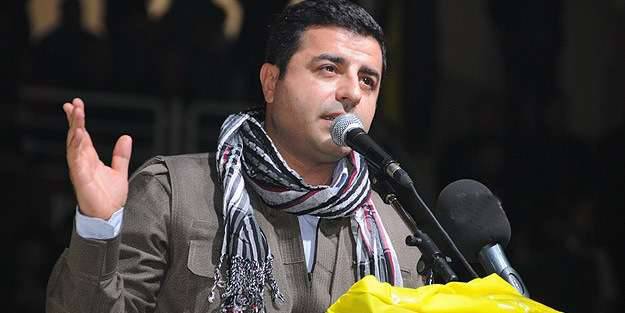
It should also be recalled that at the end of December last 2015, the leader of the Democratic Party of the Peoples of Turkey Selahattin Demirtas visited Moscow. This charismatic young politician is the leader of Turkey’s left and pro-Kurdish party, the largest in Turkey. He has always held positions markedly opposition to Erdogan. So it is now - Demirtas criticizes Turkey’s position on the Syrian conflict, negatively assesses the attack on the Russian plane and the deterioration of relations with Russia. At the same time, although Demirtas emphasizes that his party is not related to the PKK, this is done, apparently, in order to prevent possible consequences in the form of a party ban by the Turkish authorities (and such voices are already heard from the far right side Turkish political spectrum). In fact, it is the activists of the Democratic Party of Peoples who form the basis of the mass peaceful protests that are carried out throughout Turkey against the policy of Erdogan and in support of the Kurdish people. Needless to say, Demirtaş’s visit to Moscow, which was received at a very high level, meant that Russia wanted to cooperate with the Turkish opposition. The real opposition in Turkey is the left and the Kurds, as a rule, as a single bloc. That is what the party headed by Demirtaş represents. The official reason for the arrival of Demirtas in Moscow was the opening of the Society of Kurdish Businessmen. This is another nuance. As is known, the economic sanctions imposed by Russia against Turkey seriously hit the Turkish business. Accordingly, according to the business that was kept by ethnic Kurds, because, despite their national affiliation and political sympathies, in legal terms they remain citizens of Turkey. Meanwhile, many Kurdish businessmen are sponsors of Kurdish national organizations, including the Kurdistan Workers' Party, the Democratic Union of Syrian Kurdistan. A blow to their economic positions is a blow to the supply of Kurdish organizations in the Middle East, which in turn is unprofitable for Russia. Therefore, the distinction between Turkish and Kurdish business has become an urgent task for Russia. But if Russia creates special conditions for Kurdish businessmen, then in fact this will also mean her favorable attitude towards the Workers' Party of Kurdistan. In any case, the growth of confrontation with the Kurds has already plunged entire areas of Turkey into a civil war. Given the large number of Kurdish populations in other regions of the state, it is possible that, following the south-east, cities in the central or western parts of Turkey may seriously flare up. Much depends on the nature of military supplies. If more serious weapons, including mine explosives, light artillery, anti-tank complexes, fall into the hands of the Workers Party of Kurdistan, the civil war in the south-east of the country will become much more ambitious.
For Russia, the support of the Kurdish national movement can be an adequate response to the anti-Russian policy of the Erdogan regime. It is through stepping up the Kurdish national movement that it is possible not only to achieve such tasks as the self-determination of Turkish Kurds, the protection of Syrian Kurdistan from the threat from terrorist organizations, but also to significantly influence the political regime in Turkey. "Tied up" in an armed confrontation with the detachments of the Kurdistan Workers' Party, the Turkish government will no longer have enough resources to support, at least so serious, the militants in Syria.
Kurdish Revolution in the Middle East
If we turn to the analysis of Recep Erdogan’s policy on the “Kurdish issue”, then we can be convinced of its cardinal tightening over the past year and a half. As you know, from 2012 to 2015. there was a truce declared by the Kurdistan Workers' Party, which attempted, thereby, to end the almost 40-year-old armed confrontation between the Kurds and the Turkish government forces. Although Erdogan, of course, always remained a Turkish nationalist and a staunch opponent of any agreement with the PKK and the liberalization of policy towards the Kurds, until recently he preferred to act by political means. But the situation in Syria wiped out even the indulgences that were allowed in the Turkish domestic policy in 2012-2014. If before Erdogan tried to integrate Kurds into Turkish society, taking as a basis the model of general Islamic identity and appealing to the common Islamic identity of the Turkish and Kurdish peoples, the development of armed confrontation in Syria, in which the fundamentalist opposition to Asad, closely related with the Turkish intelligence services, forced him to revise his policy. Moreover, the Kurdish organizations of Turkey stubbornly did not want to follow Erdogan as part of his conservative fundamentalist project. Moreover, in the Kurdish national movement, those forces have long prevailed that in every possible way demonstrate their non-religiousness and “secularism”. Both the Kurdistan Workers' Party in Turkey and the Democratic Union in Syrian Kurdistan are secular leftist organizations that have a very negative attitude towards religious fundamentalism.
The ground for hatred of the fundamentalists became only stronger after the atrocities that the militants of the Syrian-Iraqi radical organizations worked in Kurdish and Assyrian villages. Behind the armed confrontation of Kurdish militias and militants of religious extremist organizations, an intercultural conflict has become increasingly apparent. The Kurdish national movement is unique to the modern Middle East. Firstly, unlike all the social-revolutionary movements in the Middle East and North Africa, it is emphasized secular, if not to say anti-religious. Secularism for the Kurdish national movement plays a huge role. The Workers' Party of Kurdistan and the Democratic Union of Syrian Kurdistan strongly emphasize their non-religious nature. By the way, the religious situation in Kurdish society has always been very complex: among the Kurds there are Sunni Muslims, there are Alevis (not to be confused with Alawites), there are followers of the “Ahl-e-Haq” (“Ali-Illahi”) movement. Finally, there are the Yezidis (some of the Yezidis, however, do not consider themselves to be Kurds), professing the ancient Kurdish religion, Yezidism. For the Kurdistan Workers' Party and the Kurdish national movement as a whole, the Kurdish identity is a priority, attention is not paid to religious issues. Moreover, in the detachments of the Kurdish militia, Christians - Armenians, Arabs and Assyrians, and Jews - most often, are Kurdish Jews - "lakhlukhi" fighting. Finally, among a certain part of the Kurdish intelligentsia, there is a growing trend and movement to return to Yezidism or Zoroastrianism, which, according to supporters of this process, are more in line with the Kurdish mentality. For the Turkish religious fundamentalist and conservative Erdogan, the influence of these tendencies is unacceptable - his war against the Kurdish national resistance is also a war for the interests of the Turkish religious fundamentalism and the Neo-Ottoman project.
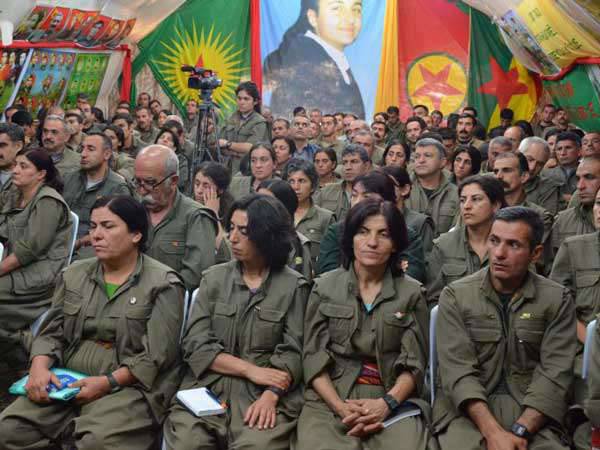
Secondly, for the traditional cultures of the Middle Eastern peoples, shocking is probably the significant place that women occupy in the Kurdish movement. In the ideology of the Kurdistan Workers' Party, women's equality issues play an enormous role. It is no coincidence that it is women and girls that we most often see in photos as fighters of the Kurdish militia. They constitute up to 40% of the personnel of the Popular Self-Defense Units. But advertise their participation in the armed confrontation and for another reason - ideological. Women's equality, declared by the Kurdish movement, is an alternative to the bleak future that women can expect in case of a victory of religious extremist organizations. That is why the Syrian Kurdish national liberation war has a “feminine face”. Such a component of the ideology of the Kurdish movement as an orientation towards self-government is very well chosen. With this, the Kurds emphasize their commitment to democratic ideals, which automatically draws on their side, as they would say earlier, "the entire progressive public." To some extent, Kurdish democracy is much more similar to democracy than the political systems of European states (there are no comparisons with Turkey at all). Naturally, the organization of the Kurdish self-defense detachments, the very life in the localities controlled by them, the democratic system of governance - all these factors contribute to the incredible growth of the popularity of the Kurdish national movement among the European and American leftists. There are numerous examples of the participation of Europeans and Americans as volunteers in the fighting in Syrian Kurdistan - in the ranks of the Kurdish people's self-defense units.
As for the policy of Recep Erdogan, by his fundamental refusal from any negotiations with the Kurdish national movement, his militant chauvinism, he creates problems, primarily for Turkey. Already, these problems are becoming more pronounced. Erdogan managed to quarrel with all neighbors - Russia, Syria, Iran and Iraq, he also has strained relations. Against the background of Erdogan’s policy regarding the Kurds in Turkey and, especially, in Syria, he is beginning to cause more and more irritation among European and American leaders.
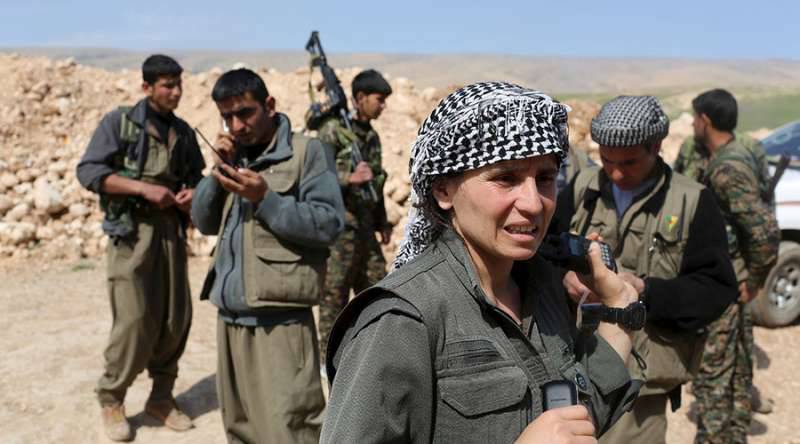
Information